The Immortal Sextet
by Charles A. Hooey
The author reviews the careers of the six soloists who took
part in the première of The Apostles which Elgar himself
conducted, and briefly surveys their recorded legacy.
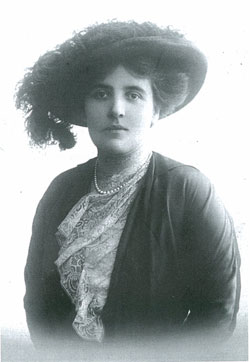 Of all Elgar's oratorio creations, The Apostles calls
for the largest group of soloists, six in all. For its first
performance at the Birmingham Festival on 14 October 1903,
the composer chose a stalwart crew, five from his homeland
and the
other from Canada. Four had taken part in previous premières,
the newcomers being Emma Albani, the Canadian, and Robert Kennerley
Rumford. They came from different backgrounds, of course, but
fashioned similar careers. So, who were these immortals, the
creators of Elgar's apostolic gem?
Of all Elgar's oratorio creations, The Apostles calls
for the largest group of soloists, six in all. For its first
performance at the Birmingham Festival on 14 October 1903,
the composer chose a stalwart crew, five from his homeland
and the
other from Canada. Four had taken part in previous premières,
the newcomers being Emma Albani, the Canadian, and Robert Kennerley
Rumford. They came from different backgrounds, of course, but
fashioned similar careers. So, who were these immortals, the
creators of Elgar's apostolic gem?
The contralto we've already met (see Elgar Journal, March 2003,
p. 11-24). With her unique brand of warmth and sweetness, Muriel
Foster (see left) had made her Angel in The Dream
of Gerontius so
utterly appealing; now she set about to impart the same magic
to Mary Magdalene.
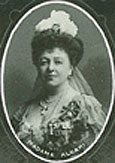 Amongst
the others, without doubt the doyenne was that petite prima
donna, Emma Albani, as the Virgin
Mary and the Angel. She was born in 1847 to the Lajeunesse
family
in
Chambly
near
Montreal. Her parents labeled her "Marie-Louise-Cecile-Emma" no
doubt with high hopes. It was not Emma's way to disappoint
so she quick-marched to the pinnacle of her profession, becoming
Canada's first, honest-to-goodness, international opera star.
Amongst
the others, without doubt the doyenne was that petite prima
donna, Emma Albani, as the Virgin
Mary and the Angel. She was born in 1847 to the Lajeunesse
family
in
Chambly
near
Montreal. Her parents labeled her "Marie-Louise-Cecile-Emma" no
doubt with high hopes. It was not Emma's way to disappoint
so she quick-marched to the pinnacle of her profession, becoming
Canada's first, honest-to-goodness, international opera star.
She was only eight when she astonished everyone at the Sacred
Heart Convent in Montreal by singing operatic arias to her
own accompaniment on the piano. Eventually she moved to Paris
to
study with Gilbert-Louis Duprez, then to Milan for a time with
Francesco Lamperti. In 1870, she made her debut as Amina in La
Sonnambula in Messina. After guesting in Malta and Florence,
she came to Covent Garden on 2 April 1875 to offer Amina again,
then Lucia di Lammermoor, Martha, Rigoletto, Linda di Chamounix and
the London premieres of Tannhauser and Lohengrin.
Her Elsa proved a "revelation!"
She did conquer the world's operatic stages, but her true home
was at the Garden. Who could forget her “deliciously girlish" Eva
nor "finely-thought" Isolde and when Herold's Le
Pre-aux-Clercs was revived in 1880, her Isabella sung "with
great effect." In "Souvenirs du jeune age," her
eyes would mist as memories of her vast, snow-enrobed homeland
flooded back. Londoners with Queen Victoria in the vanguard
grew to adore the plucky Canuck.
When not busy in opera, she often sang in oratorio with tenor
Edward Lloyd. Together at the Norwich Festival of 1881, they
sang in Sullivan's Martyr of St. Antioch and in the first
performance of Cowen's St. Ursula, and in 1889 Berlioz's
colorful Damnation of Faust with Andrew Black and a debuting
Robert Radford. A busy Handelian too, she sang between 1888 and
1902 in at least nine Messiahs on New Year's Evenings
at Royal Albert Hall.
By 1886, she had reached her prime, the heavier roles having
taken their toll. Nevertheless she made her Metropolitan Opera
debut on 23 December 1891 as Gilda in Rigoletto, then
as Desdemona in Otello with de Reszke, Donna Elvira, Valentine
(Huguenots), Elsa and Senta. By 1896, she chose to lay
aside costumes and greasepaint and turn to oratorio and concerts
and so, when Elgar was looking, she was available. Later he
would describe her voice as "golden."
She retired in 1911 but in 1916, she joined Clara Butt, Edward
Lloyd and a khaki-clad Kennerley Rumford for a huge Red Cross
Concert in Albert Hall. In the twenties, a series of bad investments
thrust her into hard times, and into the music halls to survive.
Aghast, Melba teamed with Elgar and Sarah Fischer, Albani's
protégée,
to stage a benefit at Covent Garden on 25 May 1925. Melba sang
as did Rosina Buckman, Dinh Gilly and Radford. Emma was then
elevated to Dame Commander of the British Empire. The grandeur
long gone, Dame Emma died penniless and alone in 1930.
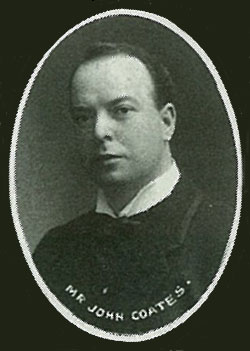 As "John", John Coates (pictured) brought
top value. Elgar knew him as "Arch-Chanter John" recalling
a famous singing cleric of their distant past. Born on 20 June
1865 near
Bradford in Yorkshire, Coates "arrived" on stage
as a baritone in 1899, singing nightly in The Absent-Minded
Beggar at
the Alhambra. Deciding his baritone was "run-of-the mill",
he paused to reframe his voice as a tenor. A wise move for
Coates would quickly excel in opera, oratorio and in concert.
As "John", John Coates (pictured) brought
top value. Elgar knew him as "Arch-Chanter John" recalling
a famous singing cleric of their distant past. Born on 20 June
1865 near
Bradford in Yorkshire, Coates "arrived" on stage
as a baritone in 1899, singing nightly in The Absent-Minded
Beggar at
the Alhambra. Deciding his baritone was "run-of-the mill",
he paused to reframe his voice as a tenor. A wise move for
Coates would quickly excel in opera, oratorio and in concert.
At Covent Garden, he sang a fine Walther in Tannhäuser on
15 May 1901, then Melot in Tristan und Isolde. For his
efforts, he was awarded the dubious task of portraying Claudio
in Stanford's Much Ado About Nothing on 30 May. To many
it was aptly named, though the music possessed a certain charm.
It seems audiences were not ready to hear their own language
sung at the Garden. On a loftier plain, he sang Faust with
Melba, Kirkby Lunn and Plançon. Although Coates held
his own there in the very best international company, it was
his
sole appearance with such an august group.
He left an eager audience in Germany to respond to a call, "William
Green is ill. Can you sing The Dream of Gerontius at
Worcester on 11 September 1902?" Thus he began a run with
The Three Choirs Festival that lasted until 1926.
He was in Cologne singing Romeo and Lohengrin when
he decided in April 1907 that opportunities existed with the
Moody-Manners and Carl Rosa Opera Companies and with Beecham's
burgeoning enterprises. For TB, he sang Hoffmann a couple of
dozen times in 1910. Early in 1911, he sang Wagner on tour with
Ernst Denhof in Leeds, Manchester and Glasgow, then in October,
with Quinlan he visited cities in the UK, South Africa and Australia,
not returning till January 1913.
His career flourished a further dozen years until 1927, when
he moved into teaching and BBC work. Remarkably in 1933 at
age 70, he joined Elgar to appear with the Hallé Orchestra
for a final Gerontius. "There stood John Coates grasping
the back of his chair, living through every phrase with all the
intensity of feeling we first experienced some 30 years ago -
it was grand to renew that early association of composer and
singers.".. Musical Times, April, 1933. Elgar's tenor
died on 16 August 1941 after a long illness.
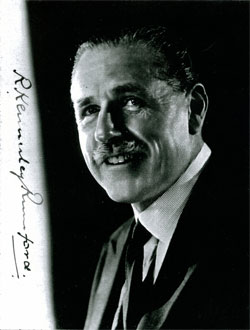 Baritone Robert
Kennerley Rumford (pictured), who sang Peter, was
born in Hampstead in 1870. He attended King's School, Canterbury
on a scholarship that helped him prepare to enter his father's
business. In Frankfurt to study German, he took to entertaining
friends, and did so well commerce was quickly forgotten. After
studying with Alfred Blume, he gave his first concert in 1903.
Tosti attended as did Maude Valerie White who was impressed.
She wrote "Three little songs" for him. In 1897 Rumford
laid eyes upon a gangly mam'selle from Bristol, a singer also
on the way up ...Clara Butt, of course. Both quite tall, they
gazed easily right into each other's eyes, while uttering sweet
nothings. Like Foster, Rumford never fancied himself in operatic
garb.
Baritone Robert
Kennerley Rumford (pictured), who sang Peter, was
born in Hampstead in 1870. He attended King's School, Canterbury
on a scholarship that helped him prepare to enter his father's
business. In Frankfurt to study German, he took to entertaining
friends, and did so well commerce was quickly forgotten. After
studying with Alfred Blume, he gave his first concert in 1903.
Tosti attended as did Maude Valerie White who was impressed.
She wrote "Three little songs" for him. In 1897 Rumford
laid eyes upon a gangly mam'selle from Bristol, a singer also
on the way up ...Clara Butt, of course. Both quite tall, they
gazed easily right into each other's eyes, while uttering sweet
nothings. Like Foster, Rumford never fancied himself in operatic
garb.
He and Clara married on 26 June 1900 amidst great fanfare,
with both Black and Albani in attendance. Emma stepped forth
to sing "O
God, Thou art worthy to be praised," an anthem that was
Sir Arthur Sullivan's special endowment.
Many a husband might have fretted, but Rumford easily played
second fiddle to Clara during her travels in Britain and to
farflung outposts of the Empire. Late in 1912, a Canadian reporter
queried
Clara about Emma Albani. "Ah! Albani!" was her quick
response, "Yes, I know her so well...there was never another
singer with such a lovely legato as hers." Composers of
the day wrote or adapted songs and duets for the famous duo.
One, Liza Lehmann, composed "Four Cautionary Tales and a
Moral" to witty lyrics by Hillaire Belloc, which Rumford
and Clara premiered at Albert Hall. Rumford proved to be an
intelligent, musically well-educated singer with good style
but vocally less
well endowed than his wife.
Rumford and Clara were prominent in New Year's Messiahs at
Albert Hall in 1911 and 1912. When the war did begin, he was
variously reported active in Red Cross causes and as Captain
in British military intelligence. After Clara died in 1936, he
re-married in 1942 and lived on until 9 March 1951.
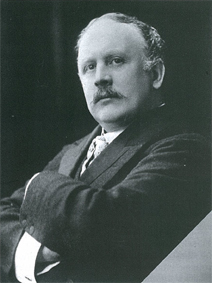 Baritone David Ffrangcon-Davies as Christus enjoyed a
rare distinction as one of five singers who appeared in the first
Proms concert on 10 August 1895. He must have pleased for he
was back fifty-two times over the next decade to sing a wide
array of operatic excerpts and songs.
Baritone David Ffrangcon-Davies as Christus enjoyed a
rare distinction as one of five singers who appeared in the first
Proms concert on 10 August 1895. He must have pleased for he
was back fifty-two times over the next decade to sing a wide
array of operatic excerpts and songs.
He was born "Dafydd Thomas Davis" in North Wales at
Bethesda (now Gwynedd) on 11 December 1855, and educated at Friar's
School in Bangor. Later, he tacked on "Ffrangcon" as
a fond salute to the range of hills near his home.
At Jesus College in Oxford, he applied to take holy orders, but
discovering his fine voice changed all that. At first he sang
tenor but at the Guildhall School of Music with Richard Latter,
Albert Randegger and William Shakespeare, he became a baritone.
The proud owner of a voice ranging from bass E to top B flat,
he made his debut in Manchester on 6 January 1890. Then on 26
April, he sang the Lohengrin Herald at Drury Lane with
the Carl Rosa Company, and on 31 January 1891 the original "Cedric" in
Sullivan's Ivanhoe at the English Opera House, London.
Now a sensitive and conscientious artist, David took his talent
overseas between 1896 and 1898 to principal concerts and festivals
in USA and Canada. He arrived in Cincinnati to sing Samson
et Dalila in concert on 21 May with Marie Brema and Watkin
Mills. Based in Berlin, he reaped acclaim at the main German
and Swiss cities, but he was polishing his technique in lieder
too. A chance to sing at Queen's Hall on 19 March 1900 convinced
him to return to stay the following year. Favourable responses
came in bundles as he went about singing new works by Elgar and
others at all the principal festivals and concerts. It is claimed
he owed his career (and income) to Elijah, a role he
sang so often that when he did, he sounded like an Old Testament
Prophet.
In 1903 at year's end, he combined teaching at the Royal Academy
of Music with production of a book, "Singing of the Future." In
May 1906 he visited Cincinnati with Elgar to sing Gerontius and Apostles.
Back home in 1907, overworked and depressed, he suffered a nervous
breakdown that abruptly squelched his singing and left him mentally
unbalanced. It is said that when he attempted Elijah anew,
he felt he was the prophet! He died in a Hampstead asylum on
13 April 1918.
Interestingly, his daughter Gwen became a soprano who in 1919
created "Etain" in Boughton's The Immortal Hour.
Later she appeared as an actress on radio and on TV where her
crossed-eyes proved an asset. She lived a lively 100 years.
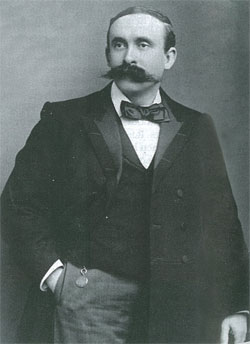 Judas Iscariot was assigned to Andrew Black (pictured), a Glasgow
chap born in 1859, who functioned as an organist, until his fine
voice propelled him into vocal study in London and in Milan.
When he first sang in public in 1897, such was his success at
the Crystal Palace, he switched to oratorio. By 1893, he gave
opera a try in the title role in Wagner's Flying Dutchman,
causing many to believe he was Charles Santley incarnate. In
Hanley he sang Samson with Albani, Ben Davies, Bantock
Pierpoint and an exciting newcomer, named Clara Butt. That year,
he also entered academia as Professor at the Royal Manchester
College of Music.
Judas Iscariot was assigned to Andrew Black (pictured), a Glasgow
chap born in 1859, who functioned as an organist, until his fine
voice propelled him into vocal study in London and in Milan.
When he first sang in public in 1897, such was his success at
the Crystal Palace, he switched to oratorio. By 1893, he gave
opera a try in the title role in Wagner's Flying Dutchman,
causing many to believe he was Charles Santley incarnate. In
Hanley he sang Samson with Albani, Ben Davies, Bantock
Pierpoint and an exciting newcomer, named Clara Butt. That year,
he also entered academia as Professor at the Royal Manchester
College of Music.
A Hull favourite, he first came in 1889 to concertize on 11 October
and again for Mendelssohn's St. Paul on 22 November. He
returned to sing Dvorak's The Spectre’s Bride (1890),
Parry's Job (1897), Handel's Acis and Galatea (1901),
a Handel and Bennett Concert (1901) and Elijah (1903).
With at least four Gerontius performances under his belt
in 1903, including one in Birmingham, Black was primed and ready
for Elgar's latest. Another ten years and he wound up his singing
career. He died in Australia in 1920.
After such a resounding reception, The Apostles became
familiar fare in Britain and Germany. The four men "repeated
their Birmingham success" during a special Elgar Festival
at Covent Garden on 15 March 1904, with Agnes Nicholls, "whose
beautiful pure voice and sympathetic style made her almost ideal" and
Madame Kirkby Lunn "who sang well like the accomplished
artist she is..." (Musical Times). Surely Muriel Foster,
if she had been in England, would have sung. She did return
to sing in The Apostles on 8 September in Gloucester.
Can They Be Heard Today?
Unfortunately the answer is "No" for Muriel and Ffrangcon-Davies,
but at least the others did leave lasting memories. Fifty-six
year old Albani visited HMV's studios two months after The
Apostles to record the first of an eventual twelve sides.
Even so late, the magic in her singing is apparent. The Herold aria,
the only relic from her operatic heyday, with most of her others,
can be enjoyed on CD.
Coates recorded his first sides in May/June 1907, his last, three
arias from Holbrooke's Bronwen, on 23 September 1929.
He waxed 71 sides overall. The Bronwens can be savoured
on Symposium 1130 while stirring accounts of Elgar's "In
the Dawn" and "Speak music" will be familiar
through their reincarnation on Elgar Interpreters CD, Vol.
2
Recording solo, Rumford favoured songs by English composers
of the day, songs such as Cowen's "Border ballad," Clutsam's "Myrra" and
Squire's "Three for Jack" but his fame lies in six
duets he recorded with Clara. Their most popular is "The
Keys of Heaven" which is featured on Pearl CDs.
Black's bright and breezy style suited that era's recording
process to a tee, resulting in just over fifty discs. His "Leap,
leap to light" from Caractacus, "a first" he
recorded in 1906, eight years after he sang in the work's premiere
in Leeds. It also is part of the Interpreters CD, Vol. 2.
For a truly unique experience, try "The Crystal Palace,
1851-1936" (Symposium 1251), to savour not only a galaxy
of the greatest voices in Handelian classics, Albani with "Ombra
mai fu" from Serse and Black in "O Ruddier than
the Cherry" from Acis and Galatea, but also to find
a strange aura of musical life as it was in 1903.
Sources:
Foreman, Dennis: John Coates; The Record Collector Vol. 38, No.
2
Fuller-Maitland, J. A.: A Door-keeper of Music; John Murray,
London, 1929
Lewis, Paul: Emma Albani's Records; The Record Collector Vol.
39, No. 2, pp 153-160
Moogk, Edward B.; Roll Back The Years; National Library of Canada
1975, p 127
Ponder, Winifred: Clara Butt, Her Life-story; George S. Harrap,
London, 1928
The Proms in Pictures; BBC Books, 1995, p. 19
Also, thanks to Wayne Turner and Graham Oakes for filling gaps
in the Ffrangcon-Davies segment and to Dennis Foreman for his
research into early performances of Apostles.
Published in The Elgar Journal, July 2003
NOTABLE APOSTLES PERFORMANCES
14 October, 1903
Birmingham Festival world premiere with Muriel Foster,
Emma Albani, John Coates, David Ffrangcon-Davies, Andrew Black;
cond. Sir Edward Elgar
15 March, 1904
Covent Garden, London (Elgar Festival) with Agnes Nicholls, Louise
Kirkby Lunn, John Coates, David Ffrangcon-Davies, Kennerley Rumford
and Andrew Black; cond. Sir Edward Elgar
14 April, 1904 Birmingham, Festival Choral Society; Cond. Sir
Edward Elgar
22 May 1904
Cologne (Lower Rhenish Musical Festival) with Frau Rusche-Endorf,
Frau Metzger-Froitzheim, Dr. Felix von Krauss, Heinrich Knote,
Theodor Bertram, J. M. Orelio; Cond. Fritz Steinbach
May/June 1904
New York, Oratorio Society US Premiere with Muriel Foster, David
Bispham
29 June, 1904 York Minster, Leeds Choral Society; Cond. Alfred
Benton, organist of the Leeds Parish Church
8 Sept., 1904
Gloucester (Three Choirs Festival) with Emma Albani, Muriel Foster,
John Coates, David Ffrangcon-Davies, Dalton Baker and Harry Plunket
Greene; Cond. Sir Edward Elgar
30 Nov., 1904
Mainz with Frau Tilly Cahnbley-Hinken, Frau Adrienne von Krauss-Osborne,
John Coates, Herr M. Buttner, Jan Hensing, Dr. Felix von Krauss
Dec, 1904 Rotterdam; Cond. Fritz Steinbach
8 March, 1905 Royal Albert Hall
14 Sept., 1905
Worcester (Three Choirs Festival) with Emma Albani, Muriel Foster,
John Coates, William Higley, Dalton Baker, Harry Plunket Greene;
Cond. Sir Edward Elgar
23 Feb., 1906
Berlin with Fraulein Clara Enler, Frau Walter-Choinanus, Felix
Senius, Herr von Wilde, Heinemann, Gunther; Cond. Prof. George
Schumann
2 May, 1906
Cincinnati Summer Festival with Mrs. Ryder-Kelsey, Janet Spencer,
John Coates, Herbert Witherspoon, Charles W. Clark, David Ffrangcon-Davies;
Sir Edward Elgar
13 Sept., 1906
Hereford (Three Choirs Festival) with Agnes Nicholls, Muriel
Foster, John Coates, William Higley, Dalton Baker, David Ffrangcon-Davies;
Cond. G. R. Sinclair
March, 1907 New York, Cond. Elgar (during tour of America)
22 March, 1907
Hull (first performance) with Cicely Gleeson-White, Alice Lakin,
John Coates (filling in for Gervase Elwes), Ivor Foster and Robert
Burnett.
Sept., 1907
Gloucester (Three Choirs Festival) with Emily Squire, Marie Brema,
Gervase Elwes, Dalton Baker, David Ffrangcon-Davies, and Harry
Plunket Greene; Cond. Sir Edward Elgar
7 Sept., 1909
Hereford (Three Choirs Festival) with Agnes Nicholls, Phyllis
Lett, John Coates, William Higley, Dalton Baker, Frederick Austin;
Cond. G. R. Sinclair
Sept., 1921
Hereford
8 June, 1922
Canterbury Cathedral, Leeds Choral Union; Cond. Sir Edward Elgar
8 Sept., 1922
Gloucester (Three Choirs Festival) with Agnes Nicholls, Phyllis
Lett, John Coates, Herbert Heyner; Cond. Sir Edward Elgar
8 Sept., 1925
Gloucester (Three Choirs Festival) with Agnes Nicholls, Astra
Desmond, John Coates, Herbert Heyner, Horace Stevens, Norman
Allin; Cond. Sir Edward Elgar
7 Sept., 1926
Worcester (Three Choirs Festival) with Agnes Nicholls, Olga Haley,
John Coates, Herbert Heyner, Horace Stevens, Norman Allin; Cond,
Sir Edward Elgar
5 September, 1935
Worcester Cathedral with Isobel Baillie, Astra Desmond, Heddle
Nash, William Parsons, Roy Henderson, Harold Williams
8 September, 1936 Hereford Cathedral with Isobel Baillie, Astra
Desmond, Heddle Nash, Keith Falkner, Roy Henderson, William Parsons
9 September, 1947 Gloucester Cathedral with Isobel Baillie, Mary
Jarred, Eric Greene, Henry Cummings, Gordon Clinton, Harold Williams
7 September, 1954 Worcester Cathedral with Isobel Baillie, Norma
Procter, Wilfred Brown, Gordon Clinton, Norman Walker, Roderick
Jones
Not published with The Apostles story in Elgar Journal














 Of all Elgar's oratorio creations, The Apostles calls
for the largest group of soloists, six in all. For its first
performance at the Birmingham Festival on 14 October 1903,
the composer chose a stalwart crew, five from his homeland
and the
other from Canada. Four had taken part in previous premières,
the newcomers being Emma Albani, the Canadian, and Robert Kennerley
Rumford. They came from different backgrounds, of course, but
fashioned similar careers. So, who were these immortals, the
creators of Elgar's apostolic gem?
Of all Elgar's oratorio creations, The Apostles calls
for the largest group of soloists, six in all. For its first
performance at the Birmingham Festival on 14 October 1903,
the composer chose a stalwart crew, five from his homeland
and the
other from Canada. Four had taken part in previous premières,
the newcomers being Emma Albani, the Canadian, and Robert Kennerley
Rumford. They came from different backgrounds, of course, but
fashioned similar careers. So, who were these immortals, the
creators of Elgar's apostolic gem?  Amongst
the others, without doubt the doyenne was that petite prima
donna, Emma Albani, as the Virgin
Mary and the Angel. She was born in 1847 to the Lajeunesse
family
in
Chambly
near
Montreal. Her parents labeled her "Marie-Louise-Cecile-Emma" no
doubt with high hopes. It was not Emma's way to disappoint
so she quick-marched to the pinnacle of her profession, becoming
Canada's first, honest-to-goodness, international opera star.
Amongst
the others, without doubt the doyenne was that petite prima
donna, Emma Albani, as the Virgin
Mary and the Angel. She was born in 1847 to the Lajeunesse
family
in
Chambly
near
Montreal. Her parents labeled her "Marie-Louise-Cecile-Emma" no
doubt with high hopes. It was not Emma's way to disappoint
so she quick-marched to the pinnacle of her profession, becoming
Canada's first, honest-to-goodness, international opera star.  As "John", John Coates (pictured) brought
top value. Elgar knew him as "Arch-Chanter John" recalling
a famous singing cleric of their distant past. Born on 20 June
1865 near
Bradford in Yorkshire, Coates "arrived" on stage
as a baritone in 1899, singing nightly in The Absent-Minded
Beggar at
the Alhambra. Deciding his baritone was "run-of-the mill",
he paused to reframe his voice as a tenor. A wise move for
Coates would quickly excel in opera, oratorio and in concert.
As "John", John Coates (pictured) brought
top value. Elgar knew him as "Arch-Chanter John" recalling
a famous singing cleric of their distant past. Born on 20 June
1865 near
Bradford in Yorkshire, Coates "arrived" on stage
as a baritone in 1899, singing nightly in The Absent-Minded
Beggar at
the Alhambra. Deciding his baritone was "run-of-the mill",
he paused to reframe his voice as a tenor. A wise move for
Coates would quickly excel in opera, oratorio and in concert.  Baritone Robert
Kennerley Rumford (pictured), who sang Peter, was
born in Hampstead in 1870. He attended King's School, Canterbury
on a scholarship that helped him prepare to enter his father's
business. In Frankfurt to study German, he took to entertaining
friends, and did so well commerce was quickly forgotten. After
studying with Alfred Blume, he gave his first concert in 1903.
Tosti attended as did Maude Valerie White who was impressed.
She wrote "Three little songs" for him. In 1897 Rumford
laid eyes upon a gangly mam'selle from Bristol, a singer also
on the way up ...Clara Butt, of course. Both quite tall, they
gazed easily right into each other's eyes, while uttering sweet
nothings. Like Foster, Rumford never fancied himself in operatic
garb.
Baritone Robert
Kennerley Rumford (pictured), who sang Peter, was
born in Hampstead in 1870. He attended King's School, Canterbury
on a scholarship that helped him prepare to enter his father's
business. In Frankfurt to study German, he took to entertaining
friends, and did so well commerce was quickly forgotten. After
studying with Alfred Blume, he gave his first concert in 1903.
Tosti attended as did Maude Valerie White who was impressed.
She wrote "Three little songs" for him. In 1897 Rumford
laid eyes upon a gangly mam'selle from Bristol, a singer also
on the way up ...Clara Butt, of course. Both quite tall, they
gazed easily right into each other's eyes, while uttering sweet
nothings. Like Foster, Rumford never fancied himself in operatic
garb.  Baritone David Ffrangcon-Davies as Christus enjoyed a
rare distinction as one of five singers who appeared in the first
Proms concert on 10 August 1895. He must have pleased for he
was back fifty-two times over the next decade to sing a wide
array of operatic excerpts and songs.
Baritone David Ffrangcon-Davies as Christus enjoyed a
rare distinction as one of five singers who appeared in the first
Proms concert on 10 August 1895. He must have pleased for he
was back fifty-two times over the next decade to sing a wide
array of operatic excerpts and songs.  Judas Iscariot was assigned to Andrew Black (pictured), a Glasgow
chap born in 1859, who functioned as an organist, until his fine
voice propelled him into vocal study in London and in Milan.
When he first sang in public in 1897, such was his success at
the Crystal Palace, he switched to oratorio. By 1893, he gave
opera a try in the title role in Wagner's Flying Dutchman,
causing many to believe he was Charles Santley incarnate. In
Hanley he sang Samson with Albani, Ben Davies, Bantock
Pierpoint and an exciting newcomer, named Clara Butt. That year,
he also entered academia as Professor at the Royal Manchester
College of Music.
Judas Iscariot was assigned to Andrew Black (pictured), a Glasgow
chap born in 1859, who functioned as an organist, until his fine
voice propelled him into vocal study in London and in Milan.
When he first sang in public in 1897, such was his success at
the Crystal Palace, he switched to oratorio. By 1893, he gave
opera a try in the title role in Wagner's Flying Dutchman,
causing many to believe he was Charles Santley incarnate. In
Hanley he sang Samson with Albani, Ben Davies, Bantock
Pierpoint and an exciting newcomer, named Clara Butt. That year,
he also entered academia as Professor at the Royal Manchester
College of Music.